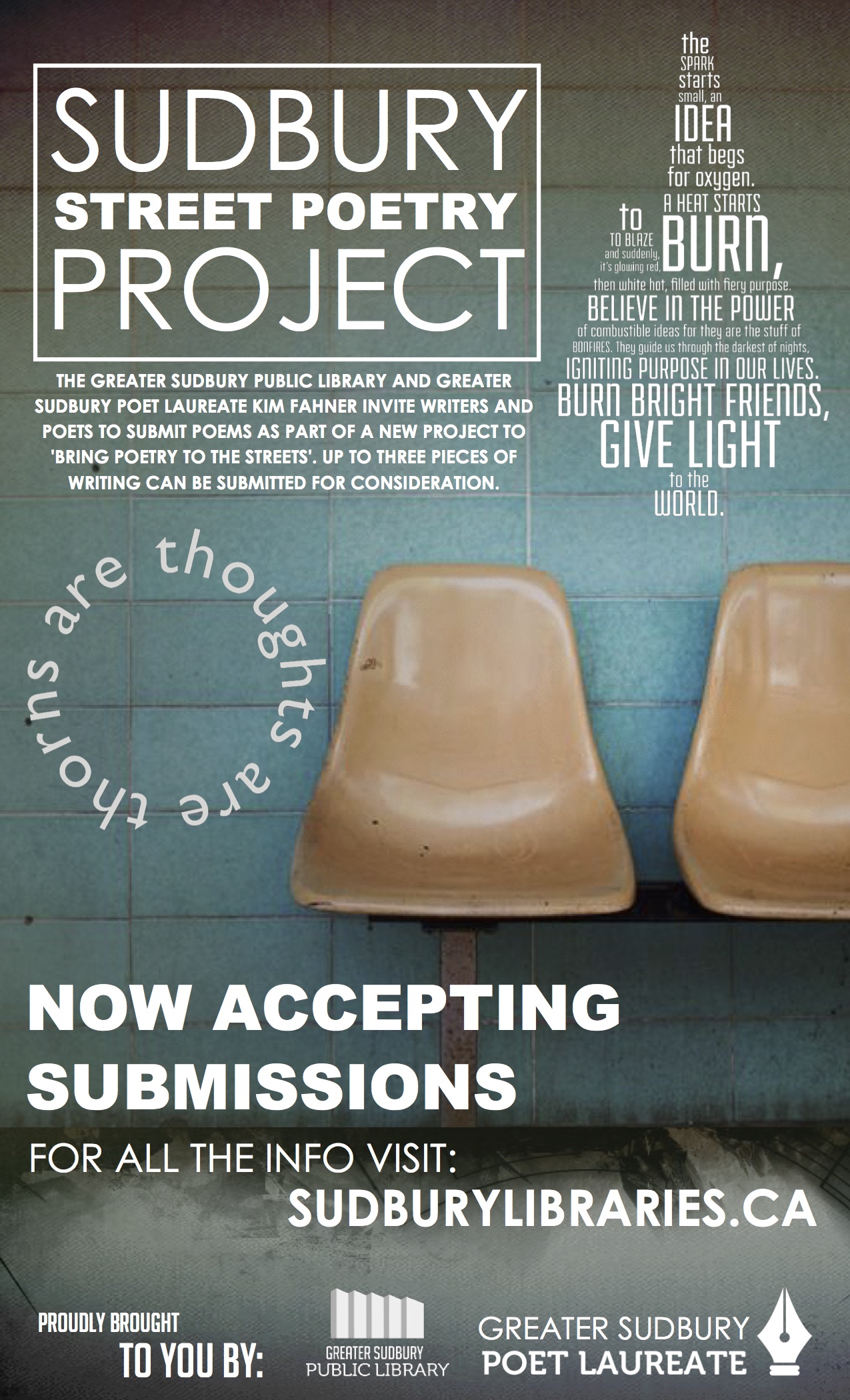Explore the World of Poetry through the Sudbury Street Poetry Project

Kim Fahner, Sudbury’s Poet Laureate, is working on filling our city’s storefronts with poetic works of art, to allow residents to experience poetry wherever they go. Find out more about the Sudbury Street Poetry project, and how you can submit your own work, in our interview with Kim.
Can you tell us a little bit about what the Sudbury Street Poetry project is and when it will be occurring?
The Sudbury Street Poetry Project is a call for poems from writers who currently live in the City of Greater Sudbury. To celebrate National Poetry Month, in April, poems will be posted in the windows of participating local businesses and organizations to heighten awareness of the genre. The call for submissions of poems closes on Monday, March 20th.
Where did the idea come from to initiate this project within Sudbury?
The idea for the Poetry Project stretches back to summer of 2012, when I attended an ekphrastic poetry writing workshop at the Anam Cara Writers’ and Artists’ Retreat in Eyeries, Co. Cork, Ireland. Eyeries is a beautiful little village on the Beara Peninsula. “Windows of Eyeries” was an art exhibition that involved every cottage in the village, with residents putting pieces of visual art in their windows. I loved the idea of having people look in other people’s windows to experience art. It seemed whimsical and spontaneous, which appealed to me. Then, in July of 2016, I was asked to read in Newcastle, England, and heard of a similar project (called the Newgate Street Poetry Festival). For that project, poems were posted in local windows. The two ideas melded and the notion for the Sudbury Street Poetry Project was born.
Why do you think its important for others to be exposed to and learn more about different forms of poetry?
I think poetry is misunderstood in popular culture. A lot of this has to do, I think, with how it’s been taught, as a genre, in the elementary and secondary school system. Most students know of ‘form’ poems like haiku, tanka, cinquain, diamante, and concrete structures, but don’t really understand the intricacy of how poetry comes into being. Part of my goal, and my focus as the city’s current poet laureate, has been to visit schools in the area to try and speak with students and their teachers about the psychological blocks that seem to emerge when poetry finds itself in the traditional classroom setting. I’m fond of visual art, so I use ekphrastic poetry as a way to introduce kids (and teachers!) to the genre in an accessible and creative fashion.
Poetry lifts me out of the regular routines of everyday life. It helps me to see the extraordinary in the ordinary, and to be mindful of what I see and experience around me. I’m hopeful that others will be able to find that poetry has a power to create joy in a person’s life.
How can we get involved with the Sudbury Street Poetry Project?
People can submit up to three poems via the poet laureate’s page on the Greater Sudbury Public library website. There isn’t a thematic focus, so topic and content is up to the poet who is submitting work. In terms of length, though, poems should be able to be printed on one page (Epic poems and ballads won’t work!).
Do you have any advice for budding writers or poets, or those who want to learn more about poetry?
The advice I’d give to new writers and poets would be to read as much poetry as they can. Part of becoming a decent poet is reading poetry that has been written by men and women from various countries around the world, and work that has been published over the course of various historical periods.
Poetic revision is something I’ve recently focused on in the last few years of my literary career. All writing is fluid, and so it comes to mind that poetry, as it must crystallize thoughts and experiences so very precisely, needs to be carefully pruned before it gets to the final draft phase. I’ve become more objective in dealing with my own writing, and perhaps this is something that comes with experience in writing. Also, if you write prose, then you need to read prose; if you write plays, then you need to read plays. Really, in my mind, I’m always learning and studying how to become a better and more efficient writer in any of the genres I muddle about in. The minute anyone thinks they are completely ‘schooled’ in writing is the minute when, I think, they become conceited and miss the point of the whole act of creation. The joy, for me, is in the act of creation, in seeing the stanzas emerge on the page. If the work moves someone emotionally after that–through its being published or read–that makes it lovely, too. ☺
Recommended Posts

CINEFEST IS BACK AT IT WITH HYBRID FESTIVAL
September 16, 2021

NLFB 49.5 TO KICK START FALL AT BELL PARK WITH DAN MANGAN, JEREMY DUTCHER, AND MORE
September 07, 2021

YES THEATRE LIGHTS UP THE GROTTO WITH LIVE CONCERT SERIES
August 30, 2021

